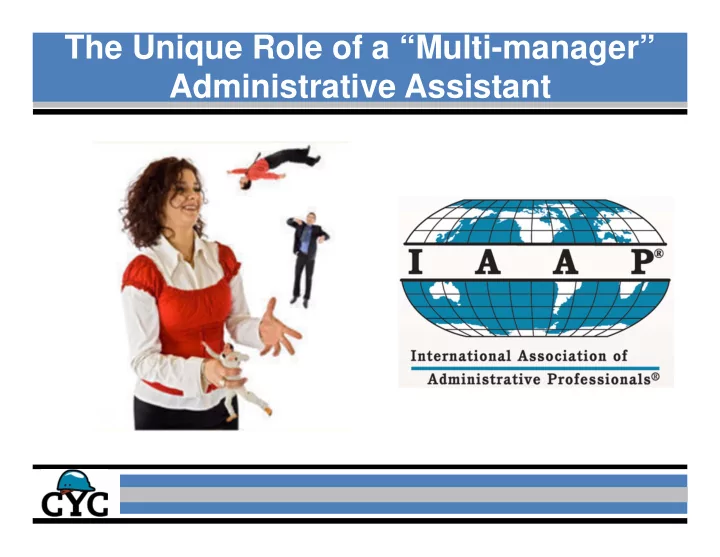

The Unique Role of a “Multi-manager” Administrative Assistant
Intro
Learning Objectives • Understand each manager’s unique work style. • Treat each manager fairly and with respect, despite your personal preference. • Recognize some of the biggest challenges for multi ‐ manager admins and how to overcome them • Understand the importance of “managing up” • Recognize signs of multiple ‐ boss madness • Identify the importance of managing office politics • If you are not careful when dealing with multiple bosses, you can let all of them down.
Check In • Check in weekly with your bosses and let them know what projects you are currently working on. • Frequently ask which projects are a priority. • If a conflict between 2 projects arise, have managers speak to each other to assess which one comes first.
Four Essential Habits of Effective “Multi ‐ manager” Admins 1. A thorough understanding of what each manager requires of your position. 2. The capacity to communicate clearly, concisely and purposefully. 3. The skills to give and receive clear feedback 4. The ability to support all stakeholders to ensure project and/or organizational success
Skills for Effective “Multi ‐ manager” Admins • Except for time ‐ critical projects, do the senior manager’s work first. • If your managers are on the same level, complete the task with the earliest due date first. • Find out what projects are coming up so you can plan accordingly. • Ask your managers to give you project materials as sections are ready. This will help prevent a last ‐ minute rush. • Communicate! Stay informed, and keep your managers informed.
Concerns and Challenges of “Multi ‐ manager” Admins Common concerns and challenges • Uncertainty in a new, strategic role • Difficulty in delegating due to fear of letting go of day ‐ to ‐ day work • Unable to plan effectively, given needs of multiple managers and business variables • Uncertain where and how to spend time
Why some “Multi ‐ manager” Admins Fail … and How to Make Sure You Don’t Outstanding admins: 1. Clearly define expectations 2. Focus on quality of work rather than time spent on work 3. Address and solve problems immediately 4. Exhibit flexibility 5. Include all appropriate people in the dissemination of information 6. Dedicate quality “face time” with their manager(s)
Why some “Multi ‐ manager” Admins Fail … and How to Make Sure You Don’t (cont) Outstanding admins: 6. Display consistency and fairness in delegating or assigning work to their support teams 7. Maintain positive relationships with support team members 8. Balance time and support to their managers 9. Maintain a positive attitude and do not complain to others about their manager(s) 10. Keep confidential information confidential
The Keys To Managing Up • Encourage your managers to have face ‐ to ‐ face or telephone conversations with each other • Ask the managers to clarify which tasks have priority … establish a prioritizing process • Know what your boss cares about … understand the desired business results • Communicate clearly, concisely and confidentially
The Keys To Managing Up • Share new and emerging information quickly so your managers are never blindsided • Have frequent and regularly scheduled meetings with each manager • Ask for a specific deadline for all projects and major tasks • Put projects on a timeline and share with all managers • Provide solutions, not problems
Time savers • Pay attention – frequently check calendars, tasks to keep from becoming derailed. • Keep on Track – create a system (folders, trays) to keep projects according to deadline date. • Create more space – walls, hanging pockets, trays • Manage time wisely ‐ Allow time blocks throughout the day to file and organize for the next day. • Triage – Keep only those items you won’t be able to retrieve again through other means.
Dealing Effectively With Organizational Politics 1. Understand your true organization chart … or the “power” chart 2. Understand the social structures at work 3. Build interpersonal relationships. 4. Know your ultimate boss.
Roles & Responsibilities Org Chart
Build Relationships • Get to know the politically powerful people in your organization • Develop relationships that cross the formal pecking order • Build strong relationships with those who have the informal power • Build your relationships on trust and respect. • Don’t pick sides • Be a part of multiple groups
Avoid Unethical Political Practices Don’t: • Try to speak on behalf of one boss to the other—try to get them to talk with each other if possible • Speak poorly about one boss to another • Discredit a rival • Cover up the truth … for anyone • Take undue credit • Blackmail, slander or spread malicious gossip
Overload
Signs of Multiple ‐ Boss Madness • Infighting among the various managers • You don’t know whom to please or when • You’re unsure about handling the conflict on your own • Trust is lacking; your loyalty is questioned • Confusion reigns!
Managing the Madness • Again, review your “true” org chart and your social structure ‐ Who do you ultimately report to? • Identify best practices for working with tough and demanding managers • Use one ‐ on ‐ one conversations as key relationship ‐ building tools
Managing the Madness (cont) • Organize a meeting with all your managers in order to outline a problem and present your solution and discuss calendars weekly. • Be careful with your e ‐ mails • Identify best practices for working with tough and demanding managers • Review tips on managing up
The Unique Role of a “Multi-manager” Administrative Assistant
Recommend
More recommend